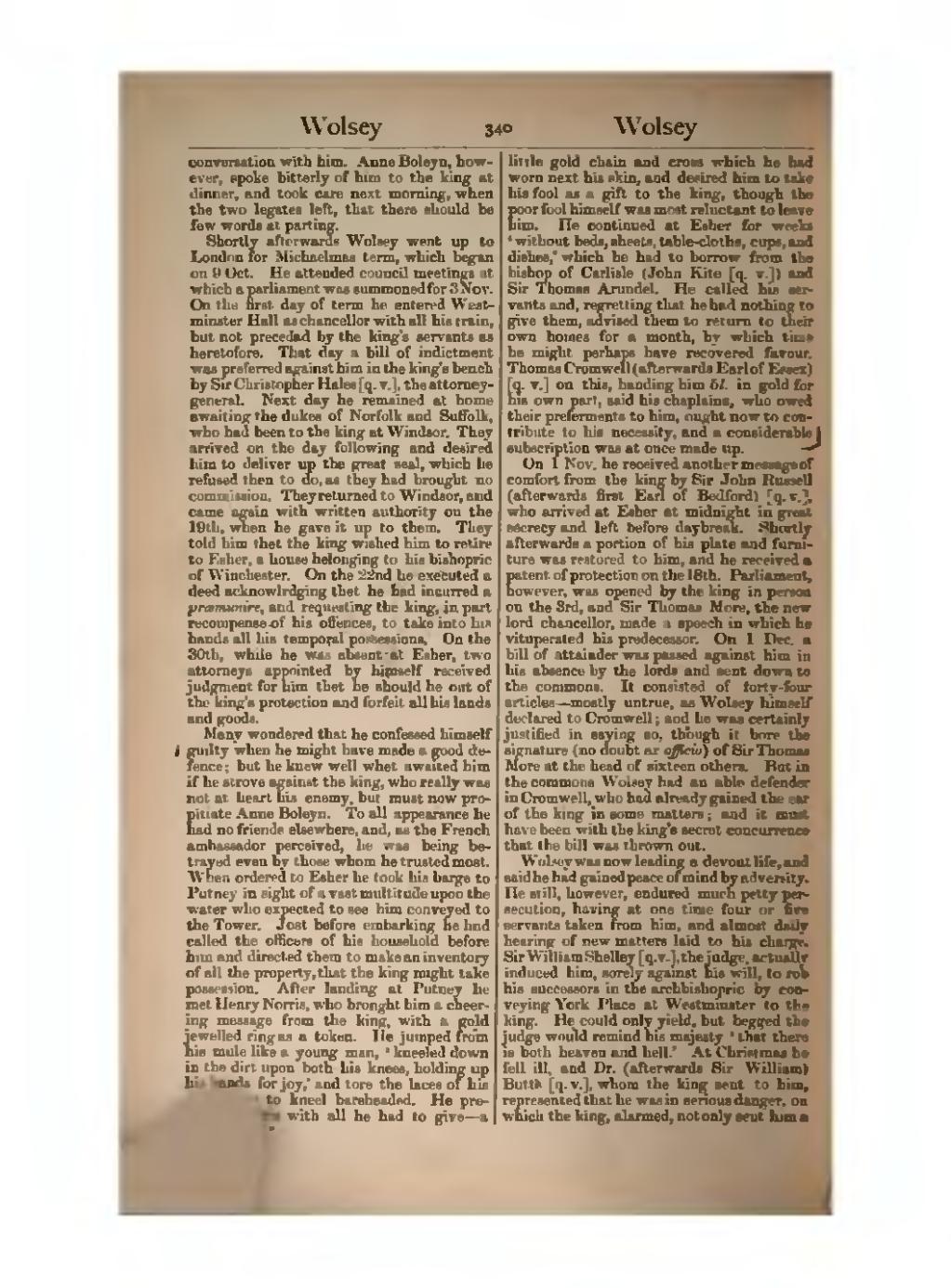conversation with him. Anne Boleyn, however, spoke bitterly of him to the king at dinner, and took care next morning, when the two legates left, that there should be few words at parting.
Shortly afterwards Wolsey went up to London for Michaelmas term, which began on 9 Oct. He attended council meetings at which a parliament was summoned for 3 Nov. On the first day of term he entered Westminster Hall as chancellor with all his train, but not preceded by the king's servants as heretofore. That day a bill of indictment was preferred against him in the king's bench by Sir Christopher Hales [q. v.], the attorney-general. Next day he remained at home awaiting the dukes of Norfolk and Suffolk, who had been to the king at Windsor. They arrived on the day following and desired him to deliver up the great seal, which he refused then to do, as they had brought no commission. They returned to Windsor, and came again with written authority on the 19th, when he gave it up to them. They told him that the king wished him to retire to Esher, a house belonging to his bishopric of Winchester. On the 22nd he executed a deed acknowledging that he had incurred a præmunire, and requesting the king, in part recompense of his offences, to take into his hands all his temporal possessions. On the 30th, while he was absent at Esher, two attorneys appointed by himself received judgment for him that he should be out of the king's protection and forfeit all his lands and goods.
Many wondered that he confessed himself guilty when he might have made a good defence; but he knew well what awaited him if he strove against the king, who really was not at heart his enemy, but must now propitiate Anne Boleyn. To all appearance he had no friends elsewhere, and, as the French ambassador perceived, he was being betrayed even by those whom he trusted most. When ordered to Esher he took his barge to Putney in sight of a vast multitude upon the water who expected to see him conveyed to the Tower. Just before embarking he had called the officers of his household before him and directed them to make an inventory of all the property, that the king might take possession. After landing at Putney he met Henry Norris, who brought him a cheering message from the king, with a gold jewelled ring as a token. He jumped from his mule like a young man, ‘kneeled down in the dirt upon both his knees, holding up his hands for joy,’ and tore the laces of his velvet cap to kneel bareheaded. He presented Norris with all he had to give—a little gold chain and cross which he had worn next his skin, and desired him to take his fool as a gift to the king, though the poor fool himself was most reluctant to leave him. He continued at Esher for weeks ‘without beds, sheets, table-cloths, cups, and dishes,’ which he had to borrow from the bishop of Carlisle (John Kite [q. v.]) and Sir Thomas Arundel. He called his servants and, regretting that he had nothing to give them, advised them to return to their own homes for a month, by which time he might perhaps have recovered favour. Thomas Cromwell (afterwards Earl of Essex) [q. v.] on this, handing him 5l. in gold for his own part, said his chaplains, who owed their preferments to him, ought now to contribute to his necessity, and a considerable subscription was at once made up.
On 1 Nov. he received another message of comfort from the king by Sir John Russell (afterwards first Earl of Bedford) [q. v.], who arrived at Esher at midnight in great secrecy and left before daybreak. Shortly afterwards a portion of his plate and furniture was restored to him, and he received a patent of protection on the 18th. Parliament, however, was opened by the king in person on the 3rd, and Sir Thomas More, the new lord chancellor, made a speech in which he vituperated his predecessor. On 1 Dec. a bill of attainder was passed against him in his absence by the lords and sent down to the commons. It consisted of forty-four articles—mostly untrue, as Wolsey himself declared to Cromwell; and he was certainly justified in saying so, though it bore the signature (no doubt ex officio) of Sir Thomas More at the head of sixteen others. But in the commons Wolsey had an able defender in Cromwell, who had already gained the ear of the king in some matters; and it must have been with the king's secret concurrence that the bill was thrown out.
Wolsey was now leading a devout life, and said he had gained peace of mind by adversity. He still, however, endured much petty persecution, having at one time four or five servants taken from him, and almost daily hearing of new matters laid to his charge. Sir William Shelley [q. v.], the judge, actually induced him, sorely against his will, to rob his successors in the archbishopric by conveying York Place at Westminster to the king. He could only yield, but begged the judge would remind his majesty ‘that there is both heaven and hell.’ At Christmas he fell ill, and Dr. (afterwards Sir William) Butts [q. v.], whom the king sent to him, represented that he was in serious danger, on which the king, alarmed, not only sent him a
